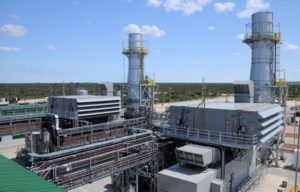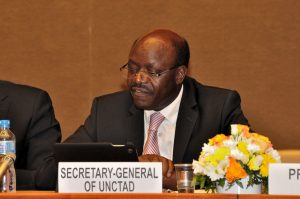
Lagos, Nigeria, November 9, 2017– Electricity distribution companies in the country on Wednesday officially reacted to the recent plan by the Federal Government to review the processes that saw to the handing over of 11 successor companies of the Power Holding Company of Nigeria (PHCN) to new investors on November 1, 2013.
Specifically, the investors told reporters in Lagos that the planned review is a distraction, adding that inherent dangers in the exercise outweighs the supposed benefits the government would derive from the review of the auction of the assets, which, they said, was adjudged to be transparent.
Zainab Ahmed, Minister of State for National Planning, had penultimate week conveyed Federal Government’s intent to review the privatization of the assets due to inherent challenges in the power sector.
Ahmed also said the privatised power sector will open up for new investment process to enable new investors further the development of the sector.
“The power sector has been privatised, but I am sure that every Nigerian will testify that the privatisation has not worked out well. What we set to achieve in terms of the development of the power sector has not yet happened.
“We have now come to a point where government, which is a shareholder in power sector, and the investors must come together and decide to cede some of their holdings to the fresh investors. The ceding of the holding to the fresh investors will enable them to inject new funds and new expertise to enable us to grow the power sector the way that will serve Nigerians.”
But at a workshop for energy journalists on Thursday, Sunday Oduntan, Executive Director, Research and Advocacy of the Association of Nigerian Electricity Distributors (ANED), said the cancellation of the privatisation would worsen the sector, and portray to foreign investors that Nigeria does not respect the sanctity of contract.
He added that privatisation was not responsible for the stunted growth of the power sector, but the inconsistent regulatory framework, which paved way for liquidity crisis therein.
He said, “The problem of the sector is liquidity. A situation whereby you are buying energy at N68.00 per KWh and are compelled by law to sell same for N31.58k will never solve the sector’s problem. Even if an angel runs the power distribution companies today it can never be whole”.
He also punctured allegations that distribution companies are deliberately rejecting power allocated to them, saying same is a misnomer.
According to him, the Transmission Company of Nigeria (TCN) constraints have largely been responsible for electricity load dumping in areas where such quantities were not needed.
Oduntan also said it was not true that the privatisation of the sector was rigged by former President Goodluck Jonathan to pave way for his cronies to acquire the power assets.
According to him, the World Bank was involved in the privatisation process and it commended the exercise as the most transparent in Nigeria’s history.
He added that it was the transparency that made the privileged class like Aliko Dangote and Femi Otedola to lose their bid for the assets.
Oduntan said a large chunk of the $1.4 billion paid by investors for the acquisition of the 11 power distribution companies was used to fulfill the severance pay of workers of the defunct PHCN.
He also faulted condemnation in some quarters that distribution companies have not added value to the nation’s power sector in the last four years.
According to him, since the acquisition of the assets, the companies have connected new electricity customers and communities, while 612,552 meters were procured and installed.
He said the companies’ network upgrade is happening rapidly than pre-privatisation era, just as improved customer care and employment opportunities have become the order of the day among the power firms in the country.
In his paper, ‘Getting to Know the Power Sector and its Challenges’, Professor Yemi Oke, an energy expert, also said the planned review of the privatisation process is not the best route for Nigeria to ply in its quest to get the power sector right.
He said electricity distribution companies are still challenged by factors like cost reflective tariff and market shortfalls, regulatory flip-flop, capital expenditure limitation and policy of eligible customers, which, he added, negates the spirit of the performance agreement government signed with the power firms.
To overcome the challenges, he emphasised the need for the Federal Government to be committed to the sanctity of the privatisation contracts/agreements.
He added, “Government sensitivity to tariff review in the wake of spiral economic indices is understood. Central to achieving a self-sustaining Nigerian Electricity Supply Industry (NESI) is a cost reflective tariff. This can be achieved by either getting the customers to pay or government pays”.
PENGASSAN To FG: Don’t Sell Oil, Gas Assets To Fund Budget
Meanwhile, oil workers under the aegis of Petroleum and Natural Gas Senior Staff Association of Nigeria (PENGASSAN) on Wednesday cautioned the Federal Government against selling profitable oil and gas assets or selling assets in the industry as scrap to fund the 2018 budget.
The union expressed its support to any other model to fund the budget aside from selling of the oil and gas assets, calling on the National Assembly to reject it as it had done in the past because the plan is not in the national interest.
Fortune Obi, PENGASSAN National Public Relations Officer, who expressed the opinion against a report on the plans by the government to sell the oil and gas assets to fund the budget, noted that the idea was rejected by majority of Nigerians when it was first proposed in 2016.
Obi, in a statement, described the plan to sell the national assets as a way to hand over our collective commonwealth to a few individuals and further impoverish majority of Nigerians.
According to him, instead of selling those assets, the government should look for alternative ways of funding the budget such as plugging loopholes and leakages in government’s finances.
“We will not allow the commonwealth of the country to be given away to cronies of the government all in the name of the sale of the assets in the industry to fund the budget.
“The government should critically evaluate the assets to look at their viability and profitability. Profitable assets such as NLNG and shares in the upstream oil and gas JV operations that have become a huge revenue earner for the country should be kept by the government to the benefit of the Nigerian majority.
“We also advise the government to endeavour to repair assets that are in a state of disrepair but not to sell them as scrap to some opportunists in the clothes of businessmen and short-sighted politicians,” the PENGASSAN spokesperson said.
Independent.ng





